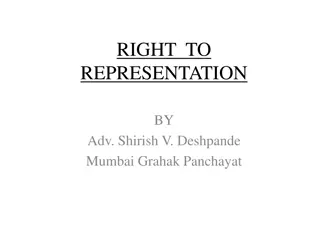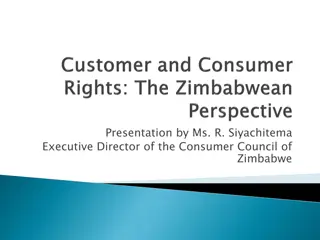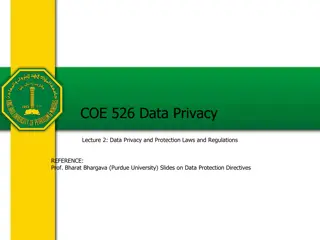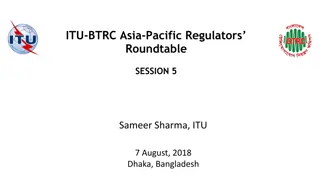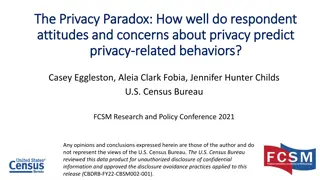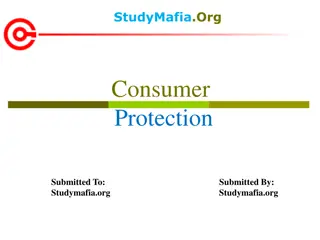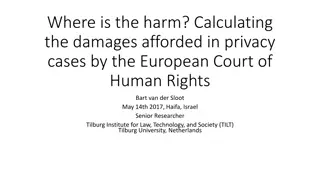Consumer Privacy Rights and Regulations Act (CPRA) Overview
The Consumer Privacy Rights and Regulations Act (CPRA) addresses the asymmetry of information between consumers and businesses, aiming to empower consumers to control their personal data and ensure transparency and accountability in data use practices. It emphasizes the need for stronger laws to protect consumer rights and provides provisions for consumer control over their personal information and limiting its use. The CPRA also introduces responsibilities for businesses in terms of collecting, using, and sharing personal data, emphasizing proportionate and necessary processing. Overall, the CPRA seeks to enhance consumer privacy and data protection in the digital age.
Download Presentation

Please find below an Image/Link to download the presentation.
The content on the website is provided AS IS for your information and personal use only. It may not be sold, licensed, or shared on other websites without obtaining consent from the author.If you encounter any issues during the download, it is possible that the publisher has removed the file from their server.
You are allowed to download the files provided on this website for personal or commercial use, subject to the condition that they are used lawfully. All files are the property of their respective owners.
The content on the website is provided AS IS for your information and personal use only. It may not be sold, licensed, or shared on other websites without obtaining consent from the author.
E N D
Presentation Transcript
CPRA 2020 - 2023
Sec. 2 Findings and Declarations (F) This asymmetry of information makes it difficult for consumers to understand what they are exchanging and therefore to negotiate effectively with businesses. Unlike in other areas of the economy where consumers can comparison shop, or can understand at a glance if a good or service is expensive or affordable, it is hard for the consumer to know how much the consumers information is worth to any given business, when data use practices vary so widely between businesses. (H) Consumers need stronger laws to place them on a more equal footing when negotiating with businesses in order to protect their rights.
Sec. 2 Findings and Declarations (I) . . . However, some advertising businesses today use technologies and tools that are opaque to consumers to collect and trade vast amounts of personal information, to track them across the internet, and to create detailed profiles of their individual interests. Some companies that do not charge consumers a fee, subsidize these services by monetizing consumers personal information. Consumers should have the information and tools necessary to limit the use of their information to noninvasive pro-privacy advertising, where their personal information is not sold to or shared with hundreds of businesses they ve never heard of, if they choose to do so.
Sec. 3 Purpose and Intent (B) Responsibilities of Businesses (2) Consumers should be able to control the use of their personal information, including limiting the use of their sensitive personal information, the unauthorized use or disclosure of which creates a heightened risk of harm to the consumer, and they should have meaningful options over how it is collected, used, and disclosed. (3) Consumers should have access to their personal information and should be able to correct it, delete it, and take it with them from one business to another.
1798.100 General Duties of Businesses that Collect Personal Information (c) A business s collection, use, retention, and sharing of a consumer s personal information shall be reasonably necessary and proportionate to achieve the purposes for which the personal information was collected or processed, or for another disclosed purpose that is compatible with the context in which the personal information was collected, and not further processed in a manner that is incompatible with those purposes.
Significant Changes From the CCPA 1. Under the original CCPA, the right to know what information is being collected, the right to access such information, and the right to know what information is sold or shared were generally limited to the 12-month period prior to the request. For these rights, as well as the right to delete and the new right to correct, consumers will now be able to request that the business disclose the required information beyond the 12-month period and the business shall be required to provide such information unless doing so proves impossible or would involve a disproportionate effort. The right to delete will now require a business to not only delete the requested information, but to notify all third parties to whom the business has sold or shared such personal information, to delete the consumer s personal information, unless this proves impossible or involves disproportionate effort. 2.
Significant Changes From the CCPA 3. A new right to request that a business that maintains inaccurate personal information about the consumer correct such inaccurate personal information. This is another move by California to provide rights similar to those under the GDPR. 4. A new right to limit the use and disclosure of sensitive personal information. Along with the new definition of sensitive personal information comes the right for a consumer, at any time, to direct a business that collects sensitive personal information about the consumer to limit its use of the consumer s sensitive personal information to that use which is necessary to perform the services or provide the goods reasonably expected by an average consumer. This adds yet another familiar GDPR principle, that of purpose limitation.
Significant Changes From the CCPA California specifically adopted several fundamental privacy principles that have long been part of the GDPR. The principles of data minimization (that businesses should collect only the minimum amount of information necessary for the transaction) and purpose limitation (that the information be limited to the purposes for which it is being collected) are specifically referenced in the recitals addressing the Responsibilities of Businesses in the Purpose and Intent section introducing the CPRA legislation.
Significant Changes From the CCPA Principles of data minimization are further evident in the CPRA additions requiring that the collection, use, retention, and sharing of personal information be reasonably necessary and proportionate. Principles of purpose limitation are plainly enunciated among the General Duties of Businesses that Collect Personal Information, which state that a business shall not collect additional categories of personal information or use personal information collected for additional purposes that are incompatible with the disclosed purpose for which the personal information was collected, without providing the consumer with notice consistent with this section. Furthermore, the GDPR principle of storage limitation also is included among the General Duties of Businesses that Collect Personal Information: a business shall not retain a consumer s personal information or sensitive personal information for each disclosed purpose for which the personal information was collected for longer than is reasonably necessary for that disclosed purpose.
Significant Changes From the CCPA The CPRA created the California Privacy Protection Agency (CPPA). It has the power to enforce the CCPA as amended through administrative actions and, along with the Attorney General, has rulemaking authority. The CCPA as amended, has an entire section devoted to rulemaking and lists over 20 issues that it expects rules to address. The CPPA is charged to [a]dminister, implement, and enforce through administrative actions this title and to protect the fundamental privacy rights of natural persons with respect to the use of their personal information. In short, the CCPA has become the most powerful enforcer of data privacy laws in the United States.
1798.40 New Definitions (k) Cross-context behavioral advertising means the targeting of advertising to a consumer based on the consumer s personal information obtained from the consumer s activity across businesses, distinctly-branded websites, applications, or services, other than the business, distinctly-branded website, application, or service with which the consumer intentionally interacts. (l) Dark pattern means a user interface designed or manipulated with the substantial effect of subverting or impairing user autonomy, decisionmaking, or choice, as further defined by regulation.
1798.40 New Definitions (w) Precise geolocation means any data that is derived from a device and that is used or intended to be used to locate a consumer within a geographic area that is equal to or less than the area of a circle with a radius of 1,850 feet, except as prescribed by regulations. (z) Profiling means any form of automated processing of personal information, as further defined by regulations pursuant to paragraph (16) of subdivision (a) of Section 1798.185, to evaluate certain personal aspects relating to a natural person and in particular to analyze or predict aspects concerning that natural person s performance at work, economic situation, health, personal preferences, interests, reliability, behavior, location, or movements.
1798.40 New Definitions (ae) Sensitive personal information means: (1) Personal information that reveals: (A) A consumer s social security, driver s license, state identification card, or passport number. (B) A consumer s account log-in, financial account, debit card, or credit card number in combination with any required security or access code, password, or credentials allowing access to an account. (C) A consumer s precise geolocation. (D) A consumer s racial or ethnic origin, religious or philosophical beliefs, or union membership. (E) The contents of a consumer s mail, email, and text messages unless the business is the intended recipient of the communication. (F) A consumer s genetic data.
1798.40 New Definitions (ae) Sensitive personal information means: (cont.) (2) (A) The processing of biometric information for the purpose of uniquely identifying a consumer. (B) Personal information collected and analyzed concerning a consumer s health. (C) Personal information collected and analyzed concerning a consumer s sex life or sexual orientation. Sensitive personal information that is publicly available pursuant to paragraph (2) of subdivision (v) shall not be considered sensitive personal information or personal information.








